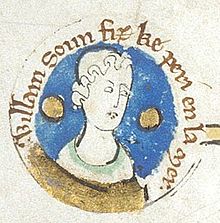William III, Duke of Normandy
| William Adelin | |
|---|---|
| Duke of Normandy | |
 |
|
| Born |
5 August 1103 Winchester, Hampshire, England |
| Died | 25 November 1120 (aged 17) near Barfleur, Normandy |
| Spouse | Matilda of Anjou |
| House | House of Normandy |
| Father | Henry I of England |
| Mother | Matilda of Scotland |
William Ætheling (Old English: [ˈwiɫiɑm ˈæθeliŋg]; 5 August 1103 – 25 November 1120), designated or titled Adelin (alternately rendered as Adelinus, Adelingus, A(u)delin or other Latinised Norman-French variants of Ætheling), was the son of Henry I of England by his wife Matilda of Scotland, and was thus heir apparent to the throne. His early death without issue caused a succession crisis, known in history as The Anarchy.
William was born in Winchester. His father, Henry I of England, was the youngest son of William the Conqueror, King of England and Duke of Normandy, and Matilda of Flanders. Robert Curthose, the eldest son of the Conqueror, had inherited Normandy, while William Rufus, the third son and second oldest surviving son of the Conqueror, had inherited England. In 1100, William Rufus was killed in a hunting incident, and Henry took the throne. By 1105, he had also dispossessed Robert of Normandy.
William's mother was Matilda (also called Edith), the daughter of Malcolm III of Scotland by Saint Margaret of Scotland. Henry had arranged the marriage to conciliate his Anglo-Saxon subjects: Saint Margaret was a granddaughter of the Anglo-Saxon King Edmund Ironside, and a great-niece of Edward the Confessor; as such, the marriage represented a union between the new Norman rulers of England and the old Anglo-Saxon dynasty.
Henry's hopes for his succession rested upon William, who was, according to Henry of Huntingdon, "a prince so pampered" that he seemed "destined to be food for the fire."
During Henry I's lifetime, William was invested as Duke of Normandy, a title he held more in name than practice. Henry made the investiture when he was pressed by the king of France, Louis VI, to do homage as Duke of Normandy. As a king in his own right, Henry was loath to comply, and in 1115 he offered to have William do this in his stead. This offer was eventually accepted in 1120, after an intervening period of war, and William did homage to Louis VI in the middle of 1120. For this reason William is sometimes counted as Duke of Normandy (as either William III or William IV). William received, as the heir to the throne, the homage and fealty of the barons of Normandy in 1115 and of the barons of England in March 1116.
...
Wikipedia
